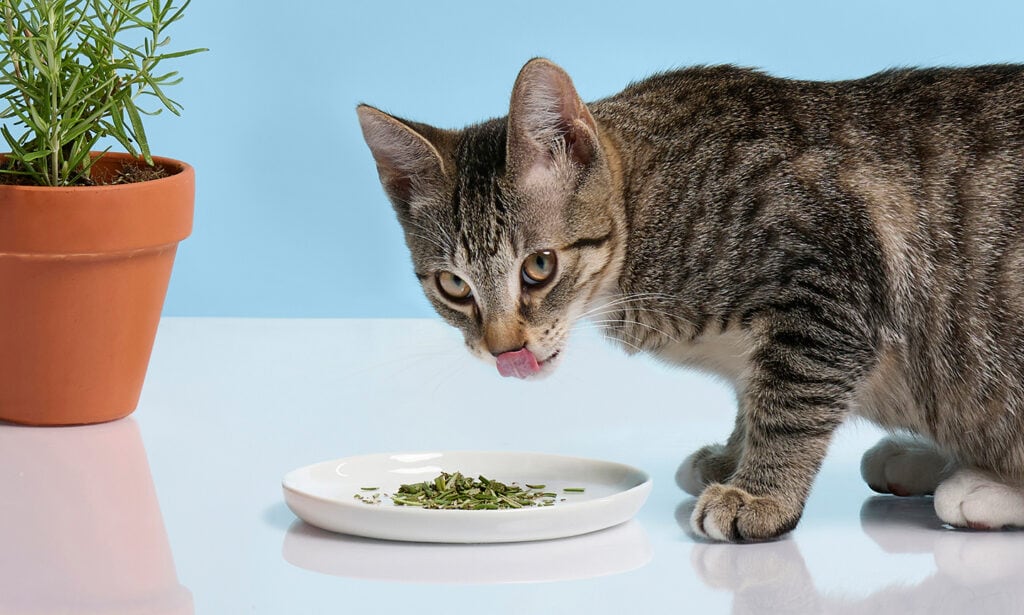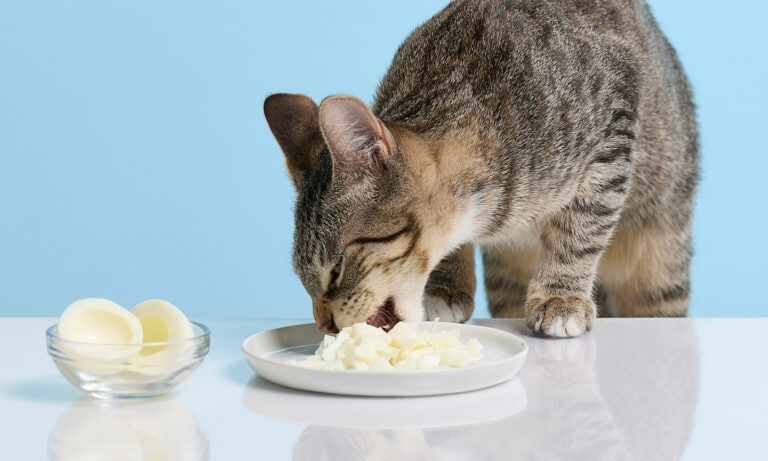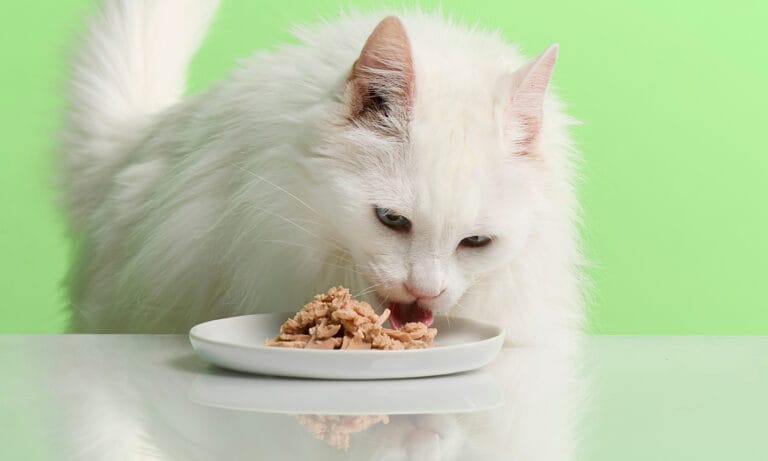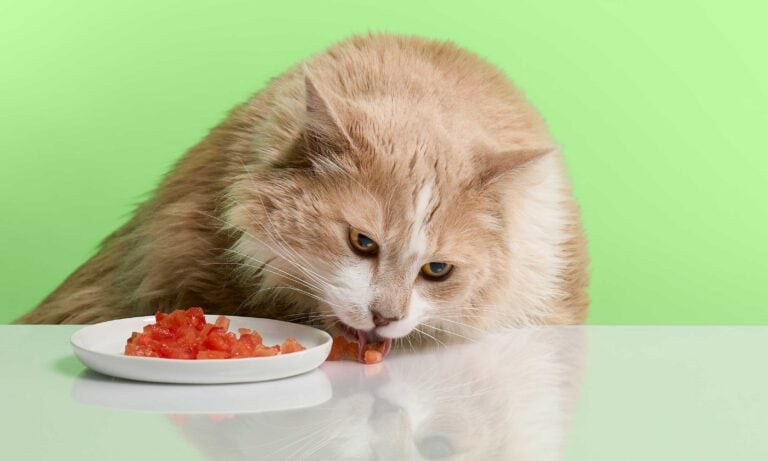Although cats are carnivores, they seem to be drawn to greens. If your curious kitty perks up every time you start to prepare herbs, you may be wondering, “Can cats eat rosemary? Or is rosemary poisonous to cats?” The good news is rosemary is safe for your kitty, but you still want to avoid adding large quantities to your cat’s diet.
To help ensure your kitty’s safety, we talked to a veterinarian to find out the benefits and risks of giving your cat rosemary and how to serve it to them.
Expert input provided by Dr. Leslie Sinn, DVM, ACVB, CPDT-KA, founder of Behavior Solutions in Ashburn, VA.
Can Cats Eat Rosemary?
Click to jump to each section.
Is Rosemary Safe for Cats?
While many houseplants and herbs are off-limits for cats, the American Society for the Prevention of Cruelty to Animals (ASPCA) lists rosemary as a non-toxic plant. So, yes, rosemary (officially named Rosmarinus officinalis) is a safe option for cats.
In fact, both rosemary and catnip belong to the same plant family, Lamiaceae, which is known for being really aromatic—part of the reason it may draw some cats in. Some other members of this plant family are oregano, thyme, mint and lavender. But just a heads up: All but thyme are considered unsafe for cats.
Benefits of Rosemary for Cats
While rosemary is considered non-toxic, we haven’t found any studies on the health benefits of fresh rosemary for cats specifically. That being said, there are some general benefits.
- It’s rich in antioxidants. Antioxidants fight free radicals, potentially destructive compounds that can contribute to chronic diseases. Therefore, they may protect your cat’s immune system and nervous system and are just generally good for health.
- It’s anti-inflammatory. Rosemary has polyphenolic compounds that fight inflammation, which can contribute to bowel diseases, skin irritation and more.
- It’s nutritious. Rosemary contains several vitamins and minerals, like vitamin A, vitamin C, vitamin B6, folate, calcium, iron and magnesium. All of these nutrients are vital to your cat’s overall wellness.
- It can serve as a form of enrichment and entertainment. Cats can smell it, roll around on it and chew on it—all things that are aspects of their natural behavior and will ultimately keep them happier, says Dr. Sinn. Enrichment is especially important for indoor cats who don’t regularly get to hunt and stalk outside.
Risks of Rosemary for Cats
While rosemary isn’t toxic to cats, it can still present some risks.
The most common risks are digestive issues. Rosemary contains a handful of volatile oils, like camphor and linalool, to name a couple. In large amounts, these can cause digestive issues such as:
- Upset stomach
- Vomiting
- Diarrhea
But it’s really the volume that’s important here, and it’s unlikely your cat would eat enough rosemary to trigger these issues.
Plus, cats are obligate carnivores, which means they eat mostly meat and cannot readily digest any vegetation, like rosemary. Because of this, you want to make sure you’re feeding them mostly meat and only giving rosemary as a treat.
And while not technically a “risk,” rosemary is often used as an ingredient in cat repellents, like Emmy's Best Pet Products’ Stop the Scratch deterrent spray. Some cats just find it offensive, so they may not be happy if you offer it to them.
How to Safely Feed Rosemary to Cats
If you want to try adding rosemary to your cat’s diet, Dr. Sinn recommends a few ways to safely feed rosemary to them.
- Offer them fresh rosemary, straight up: You can purchase fresh rosemary sprigs at the grocery store and give a small piece directly to your cat. This doubles as a toy, because they’ll likely grab it and play with it as they nibble on it.
- Add to it cat food as a flavor enhancer: Mix 1/4 teaspoon of dried rosemary or 1/2 teaspoon of fresh rosemary into your cat’s dry or wet pet food. Or use it to prepare a meal if you cook fresh food for your lucky feline.
- Sprinkle dried rosemary on their favorite scratching pads: This isn’t really a way to “feed” rosemary to cats, per se, but you can sprinkle 1/2 teaspoon of dried rosemary on their scratching pads or on the floor, just like you would with catnip. If they like it, they’ll most likely lick some as they roll around on it.
- Grow rosemary in your house. You can pot rosemary and let it grow in your house, so your cat can rub against it and munch on it whenever they feel like it. This should only be done for cats who can limit their own intake—in other words, those who won’t eat the whole plant in one sitting.
- Give them rosemary-flavored cat treats: You can buy ready-made treats, like these Applaws Chicken Filets with Rosemary, and give them to your feline friend in small amounts throughout the day.
Whatever you decide to do, make sure you’re giving your cat only a small amount. A general rule of thumb when giving your cat treats or human food, including rosemary, is the 10 percent rule: No more than 10 percent of your cat’s daily calories should come from treats. The other 90 percent should come from well-balanced cat food.
What Happens if My Cat Eats Too Much Rosemary? What Do I Do?
If you think your cat has eaten too much rosemary, Dr. Sinn recommends monitoring them for GI upset. You might notice:
- Vomiting
- Diarrhea
- Lack of appetite
These symptoms will typically resolve on their own, but if they persist for more than a day, call your veterinarian just to be safe.
If you notice your cat seems lethargic or weak, seek veterinary attention as soon as possible.
FAQs About Rosemary and Cats
Q:
Can cats eat rosemary plants?
Q:
Is rosemary oil safe for cats?
A:No, rosemary oil is not safe for cats. Dr. Sinn says you have to be super careful with essential oils and other concentrated oils around cats.
You never want to give rosemary essential oil directly to a cat or apply it topically. Because cats have an inclination to lick and groom constantly, they can easily ingest anything that you put on them. At best, rosemary oil can cause skin irritation; at worst, it can trigger a drop in heart rate and cause seizures.
Q:
Do cats like rosemary?
Q:
Is rosemary toxic to cats? Is thyme toxic to cats?
Q:
What is the cat’s body’s reaction to rosemary?
More human foods cats can eat:
Share:











